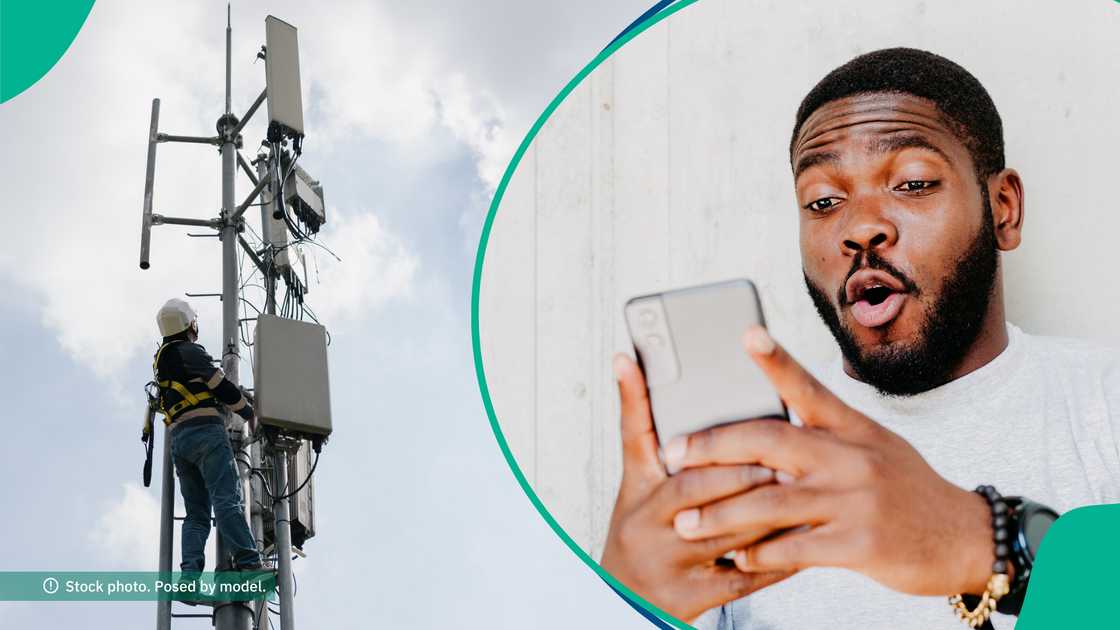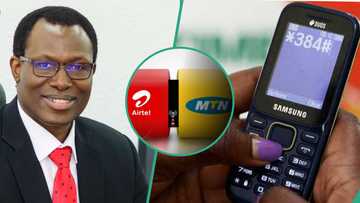NCC Approves Tariff Increase for MTN, Glo, Airtel, Others
- The NCC has officially announced that telecom operators are now allowed to increase tariffs by no more than 50%
- The commission has requested that consumer protection authorities monitor the implementation of these changes
- Telecom companies, led by the CEOs of MTN and Airtel explained that the increase is necessary due to rising operational costs
CHECK OUT: Education is Your Right! Don’t Let Social Norms Hold You Back. Learn Online with LEGIT. Enroll Now!
The Nigerian Communications Commission (NCC) has approved telecommunication companies' request for tariff adjustments, the first revision since 2013.
In a statement released on Monday, January 20, and signed by Reuben Muoka, the Director of Public Affairs, the NCC announced that operators are permitted a maximum tariff adjustment of 50%.

Source: Getty Images
This is significantly lower than what telecommunication companies are demanding.
Legit.ng had earlier reported that telcos requested a 100% tariff increase, citing operational cost burden
NCC explains tariff increase
On the new tarrif, the NCC said it is exercising its authority under Section 108 of the Nigerian Communications Act, 2003,
It added that the new tariffs remain within the limits outlined in its 2013 Cost Study.
According to the commission, the adjustments also adhere to its 2024 Guidance on Tariff Simplification, ensuring transparency and fairness in implementation.
The statement reads:
“The adjustment, capped at a maximum of 50 per cent of current tariffs, though lower than the over 100 per cent requested by some network operators, was arrived at taking into account ongoing industry reforms that will positively influence sustainability.
“These adjustments will remain within the tariff bands stipulated in the 2013 NCC Cost Study, and requests will be reviewed on a case-by-case basis as is the commission’s standard practice for tariff reviews. It will be implemented in strict adherence to the recently issued NCC Guidance on Tariff Simplification, 2024.
“Tariff rates have remained static since 2013, despite the increasing costs of operation faced by telecom operators. The approved adjustment is aimed at addressing the significant gap between operational costs and current tariffs while ensuring that the delivery of services to consumers is not compromised."
Why NCC approve tariff Increase?
The NCC noted that the adjustment was necessary to sustain investment in infrastructure and innovation, benefiting consumers through improved services, better network quality, and wider coverage.
In the statement, Muoka explained that in reaching the agreed 50% cap, the NCC prioritised balancing consumer protection with industry sustainability, Punch reports.
“This decision was made after extensive consultations with key stakeholders across the public and private sectors."
While recognising the financial pressures Nigerian households and businesses face, the NCC mandated operators to implement the new rates transparently and educate consumers on the changes.
NCC added.
“Recognising the concerns of the public, this decision was made after extensive consultations with key stakeholders across the public and private sectors.
“The NCC has prioritised striking a balance between protecting telecom consumers and ensuring the sustainability of the industry, including the thousands of indigenous vendors and suppliers who form a critical part of the telecommunications ecosystem.

Read also
Customs announces 30 days free clearance as CBN adjusts rate to clear goods after dollar crashes
“The NCC recognises the financial pressures faced by Nigerian households and businesses and remains deeply empathetic to the impact of tariff adjustments. To this end, the commission has mandated that operators implement these adjustments transparently and in a manner that is fair to consumers. Operators are also required to educate and inform the public about the new rates while demonstrating measurable improvements in service delivery."
The NCC assured Nigerians of continued engagement with stakeholders to maintain a telecommunications environment that protects consumers while enabling the ecosystem that drives connectivity across the nation.
The commission said:
“Beyond protecting consumers, the commission’s actions are designed to ensure the long-term sustainability of the industry, support indigenous vendors and suppliers, and promote the overall growth of Nigeria’s digital economy."
What to expect in new tariff changes
MTN, GLO, Airtel and other telecommunication companies are now set to adjust their rates.

Read also
50% tariff hike: Subscribers open up on next line of action after failing to reach truce with NCC
Based on the new approval, here is what Nigerians are expected to pay
Currently, Nigerians pay N350 for 1GB, which will rise to N525 with a 50% increase; a N3,000 monthly plan will also increase to N4,500.
Phone call rates will go from N11 to N16.5 per minute, and SMS rates will rise from N4 to N6 per message.
Reacting to the increase, Caroline Mbugua, Senior Director of Public Policy, & Communications Sub-Saharan Africa told Legit.ng that Nigerians will bring improvement of service.
She said:
"The main objective of the tariff is to ensure that customers can access a reliable and high-quality network while also ensuring that providers have the necessary cushion to invest.
"If network providers are not making a return on investment, as I mentioned, it becomes very difficult for them to improve the quality of service."
Texting costs Nigerian phone users N44bn

Read also
GSMA: NCC’s decision to hike telecom tariffs by 50% to drive investment in Nigeria’s digital future
Legit.ng reported that Nigerian telecom subscribers spent N44.7 billion on sending text messages (SMS) across networks, even though many messages went undelivered.
These undelivered SMS, coupled with charges from mobile network operators (MNOs), have caused subscribers ongoing frustration.
Proofread by Kola Muhammed, journalist and copyeditor at Legit.ng
PAY ATTENTION: Сheck out news that is picked exactly for YOU ➡️ find the “Recommended for you” block on the home page and enjoy!
Source: Legit.ng




